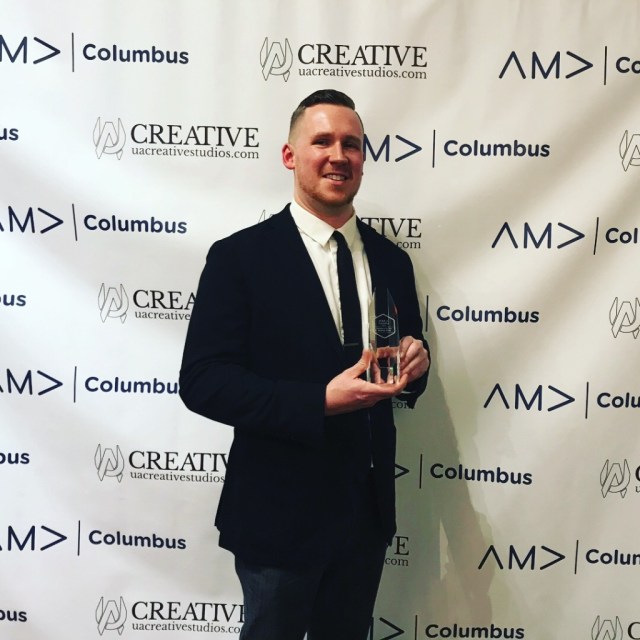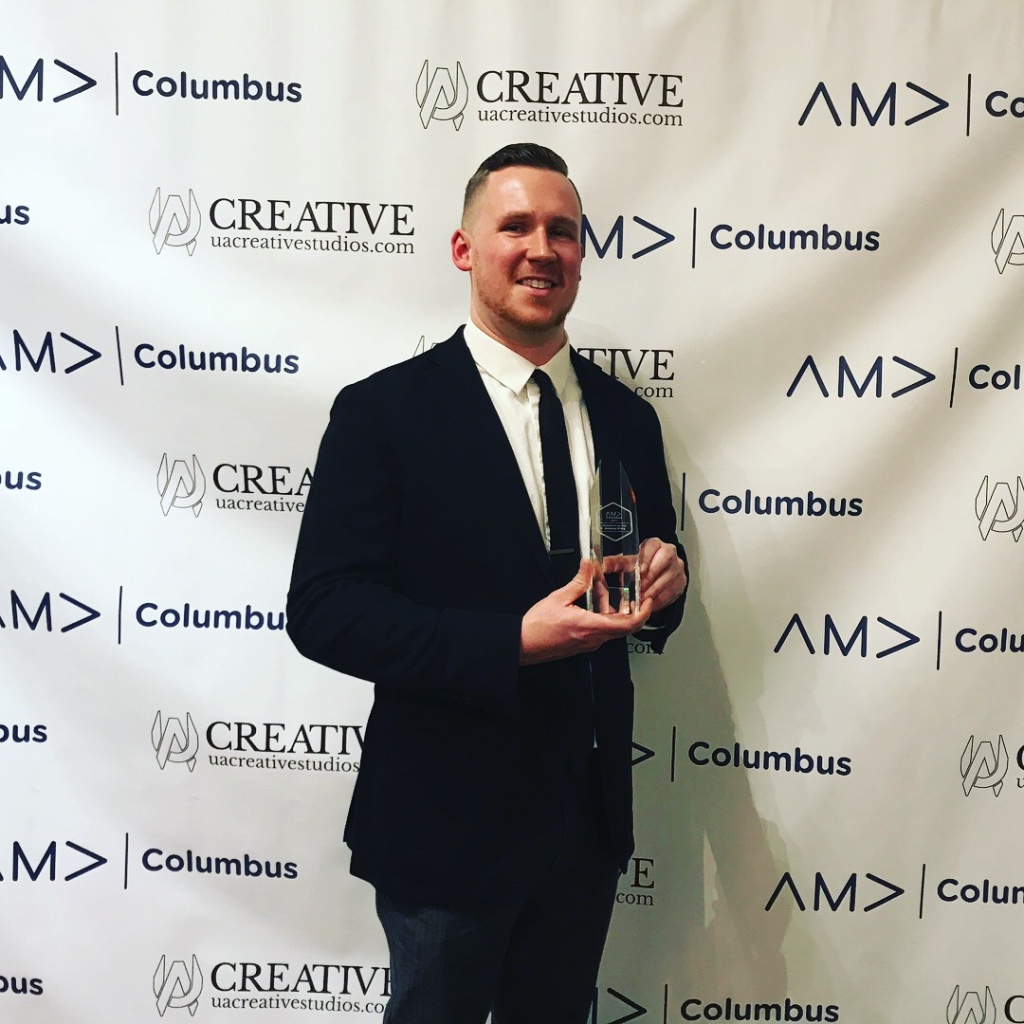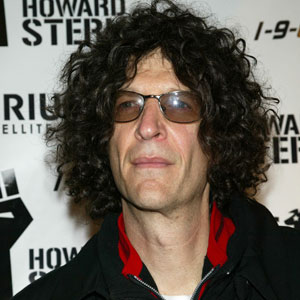
Curiosity, fear, intelligence, luck, experience, resources and support, dedication, … and doing work that stands out. All of those things led me to being named inaugural Marketer of the Year for 2017 by the Columbus American Marketing Association at the Achievement in Marketing Awards in January, 2018.
Yeah…this is November and this isn’t timely, but I’ve had a busy year.

I’m not going to lie, I’ve always felt that I do good work that stands out, but I was shocked and incredibly appreciative to be named Marketer of the Year. I’ve heard lots of people who win awards say things like “I don’t know where I put the trophy…maybe the bathroom” when asked about the award in interviews. Not I; I do care about this. In some ways I felt that it validated the work I’ve done and its results, especially since the award application submissions were judged by my peers in Rochester, NY.
Feeling validated by an award may sound a little petty or sad to some people, but I could care less. As a kid who proudly went to Columbus Public Schools and grew up in the Linden neighborhood of Columbus from blue collar divorced parents, I may have already accomplished more than most would have expected. For that reason I think writing this can help inspire others.
How to Become Marketer of The Year:
- Curiosity:
I have a great interest in what drives people to make decisions and I find it thrilling to see the response to work that I’m involved in. Throughout my marketing career there’s been no better feeling than to put in my best efforts and then to see verifiable revenue and results roll in. In marketing you’re observing human nature and what changes in society are driving people to change their habits. To me, there hasn’t been a more important motivator than this in my career.
Michael Jordan calls this “The Love of the Game“.
- Fear:
Nearly a decade into my career in marketing, each day I still find myself asking “Do I really know what the hell I’m doing?“.
Why? For all of the processes we implement and skills that we as marketers learn, at the end of the day we’re at the mercy of our work resonating with our audience. Of course you do your best to ensure that it does, but you never know until it’s out there.
This is a never-ending process, and its why I strive to get better every day.
- Luck:
In anyone’s life, luck and chance play a humongous role in their experiences and success or failure.
Frankly, I have absolutely no idea how many applicants there were for this award. Maybe it was 100 people, or maybe it was just me.
I could have never been hired at Caster Connection or worked with Christian Howes and been given the opportunities to do the work I’ve done, but luckily I was.
Maybe the most important part though is to be prepared when luck arrives.
- Experience:
As mentioned above, I’ve experienced astonishing evolutions in the organizations that I’ve worked in, which has necessitated that I also evolve quite a bit along the way. From my early days in launching marketing efforts in general, to developing my skills and managing a growing department, I’ve learned what does and doesn’t work, better practices in leadership, and how marketing’s efforts affect an organization as a whole.
In summary, perhaps the biggest aspect of my growth as a marketer has been moving from focusing more on tactics in my early days to now focusing more on strategy.
- Resources and Support:
One of the biggest factors in how I’ve arrived at this point in my career is the support of those I’ve worked for and their investment in the marketing department and me.
With Mr. Howes, I was able to jump in on the ground level of how a small business is run, implement tactics that work in that arena (and specifically the music industry), and was given the trust and opportunity to try my hand at things I had never done before.
Caster Connection has given me the resources to engage in marketing that can produce extraordinary results, because the work that the marketing department has done over time has earned trust in our abilities to produce. Starting slowly by testing the waters with tactics like mass email and collateral gradually grew to investment in aggressive branding of products, the launch of an industry-standard e-Commerce site, a significant brand refresh, expanding resources and head count, and more.
The point is, I had people who believed in me and gave me great opportunities, and in return I’ve worked to make sure their belief is justified.
On top of all of this, I’ve worked with some kick-ass people in marketing who help me look good, and I can’t say thank you to them enough.
- Dedication:
I give a damn about the work I do, and I give a damn about standing out and doing great work. It isn’t in my nature to skate by, do the minimum and lay on the couch all night after work.
- Doing Work that Stands Out:
George Lois’ Damn Good Advice (For People with Talent), working with Cult Marketing, an eCommerce launch, and a brand refresh I’ve been apart of have all shaped my career in marketing.
- Damn Good Advice (For People with Talent) is a short and sweet read from legendary Ad Man George Lois that gets to the heart of creating work that grabs your audience’s attention, whether they want to give it or not. I keep this concept in mind for any content project I’m involved with.
- Cult Marketing is a marketing firm in Columbus, Ohio that I collaborated with for 2-3 years that advocated for much of the same things that George Lois did, with particular focus on differentiating businesses that deal in commodities by focusing on developing emotional appeals. This early-career experience helped shape my thinking in how to create content that actually resonates with people.
- My eCommerce journey has included experiences involving conception of the website, to interviewing a baker’s dozen web dev firms, to implementation of well-planned content strategy for SEO, and strategy revolving around continued growth and expansion for various stages of the sales funnel. This has been one of my most rewarding and most enjoyable endeavors, as the results of my department’s work can be registered in the success of the site. Adept Marketing has been a fantastic partner in this journey.
- The brand refresh I took part in was a huge career milestone. It involved defining brand tenets (not a small task), official fonts, brands logos, and an official style guide. This is easily summarized in one sentence, but it was a year-long process that took countless hour less, and left an indelible mark on a decades-old organization.
Have a questions on how to grow in your marketing career? Leave a question in the comments section.
—
Tonight’s Box Score: 57 points, 12 boards, 15 dimes, 1 Block, 2 Steals, 0 Turnovers.








 LeBron James (above) and Howard Stern
LeBron James (above) and Howard Stern
